Dwight White Collar Crime Lawyer, Kansas
Sponsored Law Firm
-
 x
x

Click For More Info:
-
The Law Offices of Richard L. Cooper, P.A.
848 Brickell Avenue Suite 800 Miami, FL 33131» view mapDWI/DUI, Drug Trafficking, Felony Nationally Ranked Top 40 Under 40
With Richard L. Cooper you can expect a trusted confidant who will work diligently to fully understand your case and determine a road map to help you regain control of your life.
800-756-2781
Not enough matches for Dwight White Collar Crime lawyer.
Below are all Dwight Criminal lawyers.
Stanley R. Ausemus
✓ VERIFIEDHere at the law offices of Stanley R. Ausemus, Chartered, my mission is to provide quality legal support and counsel to my clients. I have a reputatio... (more)
John Wallace Thurston
Lawyer John W. Thurston is an experienced Northeast Kansas DUI defense lawyer who has successfully completed extensive training that puts him in a uni... (more)
Bentson R. Oleen
✓ VERIFIEDIf you need an attorney that will always protect your best interests, call the Oleen Law Firm today. The Oleen Law Firm is committed to defending our ... (more)
Thomas Dean Addair
Thomas Addair graduated from Manhattan High School and Kansas State University. He attended law school at the University of Kansas. This is where Tom ... (more)
Christopher E. Biggs
Joshua Kyle Douglass
FREE CONSULTATION
CONTACT
 Richard L. Cooper Miami, FL
Richard L. Cooper Miami, FL AboutMiami Attorney at Law
AboutMiami Attorney at Law ServicesCriminal Defense
ServicesCriminal Defense





